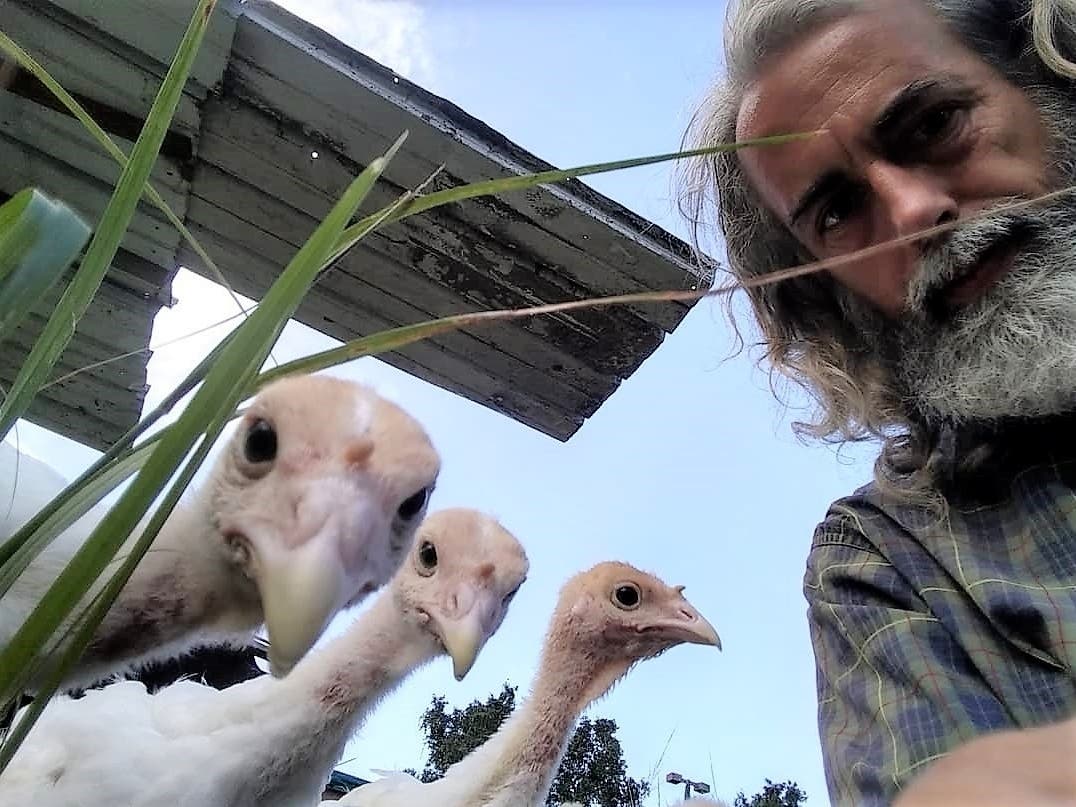TAMPA, FL — Between supply chain backlogs that have limited the delivery of turkeys to grocery stores and an increased demand in organic, free-range meats, it’s been a banner Thanksgiving for TrailBale Farm in Temple Terrace.
“I raised more turkeys than ever, and I sold out earlier than most years,” owner Travis Malloy told Patch. “My price hasn’t changed in the last four years, but I’m getting more competitive since other prices have risen.”
Malloy left his engineering job in the aerospace industry and he and his wife, Jamie, started the 8-acre farm at 8913 Bowles Road in 2013 with what he describes as “20 percent vision and 80 percent determination.”
They raise chickens, pigs, sheep and turkeys, rotating them to different pastures to ensure that the land remains fertile without the help of fertilizers and chemicals and the animals are fed organic foods and treated humanely.
For the Malloys and their son, Hank, who helps out on the farm, farming is as much a lifestyle as a living.
“We farm for the environment, for food independence, for healthy local food, for animal welfare, for worker welfare and for community connections,” Malloy said. “We don’t farm to get rich. We don’t farm for awards or attention. We farm because we love it.”
According to the Florida Certified Organic Growers and Consumers Inc., which promotes organic, regenerative and sustainable agriculture, with labor-intensive large-scale farms and ranches being sold off for development, family farms like Malloy’s that specialize in organic, farm-to-table produce are helping to fill the food gap.
According to the USDA, organic farms now provide 17 percent of the total produce consumed by Americans.
The National Sustainable Agriculture Coalition predicts that these farms that use ecologically-based production systems to minimize health risks to humans, animals and the environment will eventually outproduce the big farms dependent on fertilizers, hormones, GMOs, antibiotics and steroids.
Like this article? Sign up for our newsletter and get it delivered every weekday. It’s free!
In 2019, there were 16,585 certified organic farms in the U.S. with 5.5 million acres in production and total sales of $9.93 billion.
Between 2016 and 2019, sales of organic crops increased 58 percent. Livestock and poultry products (milk and eggs) saw a small increase of 12 percent while livestock and poultry increased by 44 percent.
And organic sales of America’s favorite Thanksgiving entrée, turkeys, increased a whopping 68 percent.
In Florida, organic farming is now the fastest-growing sector in the agriculture industry with consumer demand for organic food growing at a steady 20 percent or more annually since the 1990s, according to the University of Florida Institute of Food and Agricultural Sciences Extension. Currently, said the extension, demand for organic meats and produce is increasing faster than the supply.
Nevertheless, the number of organic farms in Florida is low compared to traditional agricultural acreage.
Florida has 47,500 farms, citrus groves and ranches with a combined 9.70 million acres.
Of those, only 130 farms encompassing about 11,000 acres are organic. (Under Florida law, to be certified organic, no synthetic chemicals can be applied to the land on which the food is produced.)
As of the last study done in 2019 by the National Sustainable Agriculture Coalition, there were 16,585 certified organic farms in the United States. California leads with 3,012 farms followed by Wisconsin (1,364), New York (1,321), Pennsylvania (1,048) and Ohio (785).
On Thursday 95 percent of Americans plan to sit down to feast on turkey, dressing and all the trimmings, according to the National Turkey Federation. The NTF estimates that 46 million turkeys are eaten every Thanksgiving.
However, this year many American families may have to settle for an alternative, according to Joel Brandenberger of the NTF.
“When American consumers head to the grocery store, they expect to see a meat counter filled with an abundance of animal protein options,” he said. “America’s farmers, ranchers and processors produce the highest-quality animal protein in the world. However, bringing nutritious and affordable animal protein to the plates of consumers requires a strong, efficient supply chain. Shutdowns and disruptions to production caused by the COVID-19 pandemic have simply underscored the urgency of the situation.”
The NTF said restrictive immigration policies are exacerbating the problem and is calling on Congress to remedy the problem.
“When there’s not enough labor on farms and ranches or in processing plants, it is nearly impossible to meet demand,” Brandenberger said. “That is why we must pass legislation now to provide for these needs, both on farm and at the processing level.”
Florida Commissioner of Agriculture Nikki Fried is also calling on Congress to aid farmers. She said American policies allowing the imports of cheaper products from Mexico where pesticides are used liberally and there’s a lack of government oversight not only endangers the livelihood of farmers but puts American families at risk.
Farmers “need timely and effective relief from the federal government to level the playing field, because right now, we know Mexico and others are not fighting fair,” she said.
Malloy, who describes himself as just a “farmer guy who believes that good, healthy, local food should be available to all,” said the changing attitudes of consumers and a desire for healthy, nutritious, chemical-free foods will do more for him and other small, organic farmers than any federal legislation.
And now that Americans have seen how easily supply chain snafus can impact their ability to obtain those healthy foods, Malloy predicts they will look to local growers to fill their pantries and refrigerators.
“I think these shortages are raising awareness about the fragility of a huge food system,” Malloy said. “More people are realizing that we should have local food resources, which won’t be as easily disrupted.”
Nationally, turkeys are an $18 billion business, said the NTF. More than 210 million turkeys are consumed in the U.S. each year, including 46 million at Thanksgiving. Nearly 88 percent of Americans polled by the NTF said the main course at their Thanksgiving dinner is turkey.



